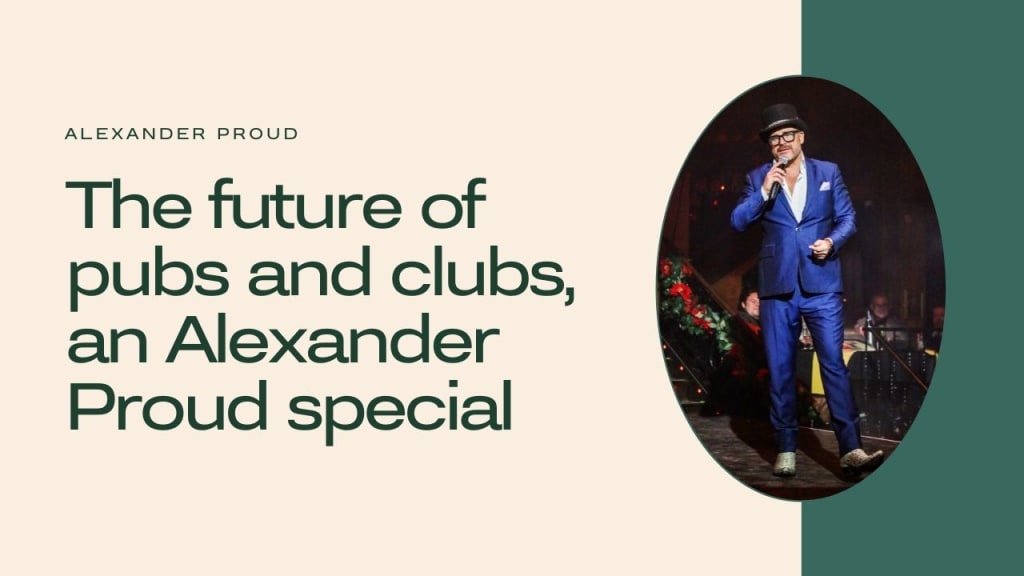The future of pubs and clubs, an Alexander Proud special
Owner of Proud Group, Alexander Proud, thinks that the perception of pub closures is wildly warped, and people need to know the truth.

Alexander Proud is frustrated that “everyone gets misty eyed about country pubs going out of business, but seems to ignore the amount of London venues that are being forced to close.”
Gentrification gone wild, says Alex Proud
He cites the example of Madam Jojo’s being forced to close several years ago; a venerable, world-famous and much-loved Soho institution which shut its doors after a violent altercation between the club’s bouncers and a customer.
Alexander Proud notes that “It was pretty nasty and their license was rightly suspended but the club took appropriate steps, it changed its manager, looked at it’s policies, and appointed an approved team of bouncers. However, subsequently, Madam JoJos, which had traded under that name since the 1960s, had its license permanently revoked and half a century of Soho history ended with the stroke of a bureaucrat’s pen. Why? Because it’s an adult establishment, that doesn’t appeal to tourists, and doesn’t fit with the newly sanitised Soho. It’s a part of our culture that isn’t valued”.
Alexander Proud says that he isn’t cold to the fate of country pubs, but he can also see that often, a village pub closes because it isn’t viable as a business. “I like the idea of country pubs, but I can’t spend every night out drinking to keep them open. I’m all for community co-operatives and novel ways of running them. But you can’t create punters out of thin air.” says Alexander Proud.
“However, none of this applies to places like JoJos which was a profitable business in the heart of a world-famous entertainment district.”
Alexander Proud notes that “very little of Soho is recognisable as the Soho of films, novels and national nostalgia. It’s now flooded with upmarket restaurants, trendy clothes shops, coffee bars and groovy office space.”
“More and more, it’s about residential developments. Traditionally parts of Soho have always been residential, but residents were Bohemian, artistic, eclectic, and they didn’t move there for a quiet life or as a property investment.” says Alexander Proud
Alexander Proud acknowledges that “Soho has managed to stay agreeably interesting for a surprisingly long time. Even into the 2000s, it still felt like a kind of alternative haven, a place apart from the increasingly money driven city that surrounds it. But recently all that has changed.” Alexander Proud notes that “Westminster Council, cheered on by the usual cohort of property developers and moneymen, has embarked on an aggressive process of gentrification.”
A tourist host spot
Soho is becoming a location that only American tourists in their mid-50s think is interesting or edgy. Its a grown up Disneyland without any edge or underbelly. Alexander Proud mourns the loss of: “old venues with layers of history and 3am licences”. He notes that developers don’t like these and neither do gentrifiers and dull conservative stooges (both large and small C) in Westminster Council.
Planning applications for swanky new apartments are approved in place of century’s old drinking establishments that had a unique culture, history and clientele, but which wouldn’t help the Council attract high paying buyers and renters.
Alexander Proud feels that this is all incredibly short-sighted. “The UK’s night-time economy is huge and an enormous part of what makes our cities such exciting, creative and vibrant places to live. It’s worth billions and provides employment for over a million people (10% of the workforce). Bars, pubs, clubs, restaurants and theatres are drivers behind the renaissance in urban living and are a big draw for tourists and in the wake of Covid that is more important than ever for our National economy.”
If we keep erasing everything that makes London eclectic and unique, we turn it into an upmarket, outdoor shopping mall that no-one will want to visit. They’ll go to Paris, or Berlin or New York instead. Alexander Proud is worried that “a vital part of the UK’s cultural capital will be lost.”
Alex Proud questions council rationale…
Councils are quick to close nightclubs and bars but anti-social behaviour that has its roots in other businesses is shrugged off. Alexander Proud points out that “Kids can buy alcohol far more cheaply from supermarkets than in bars, and drink without supervision or rules. I have yet to see a Tesco Metro closed because someone bought a couple of litres of cheap vodka there and then beat the crap out a stranger.”
“We have zero tolerance for the local clubs and pubs that make an area an interesting place to live but we display endless tolerance for the alcohol discounting chain supermarkets on every stretch of every high street.” says Alexander Proud
Alexander Proud also comments that there is a one-size fits all policy that isn’t really logical. “The law does not differentiate between a sleepy village in the Cotswolds and Camden, plus London clubs are required to install airport-style scanners and share data on dodgy punters in a way that violates God knows how many privacy laws.”
Inner city clubs may not be perfect, but they are already held to standards that no other industry is and are always presumed guilty until proven innocent. Alexander Proud dreams of a day when “nightclubs are dealt with like banks. ‘Oh, you’ve been laundering millions of pounds of drug money through your club. Don’t do it again naughty boy, rap knuckles.”
Is there an end in sight?
Sadly, Alex Proud feels that we are in the grip of a new profit driven puritanism. “An unpleasant cocktail of councils too lazy to see what makes cities thrive; developers who use their legal muscle, poor planning laws and rich dullards who think they’ve bought themselves ‘cool’, but promptly start complaining about noise.”
Alexander Proud fees that if we want to maintain cities that are vibrant hubs of culture, creativity and attract youth, and diversity as well as tourists and property owners, we have to allow for a broader spectrum of nightlife and look at the long term health and potential of urban areas. That means fairer planning laws and a voice in government that speaks on behalf of a billion pound industry that has been part of our history for centuries.
About the Creator
Alexander Proud
Alex Proud is now viewed as a distinguished commentator on issues surrounding media and the photography and entertainment industries.






Comments
There are no comments for this story
Be the first to respond and start the conversation.